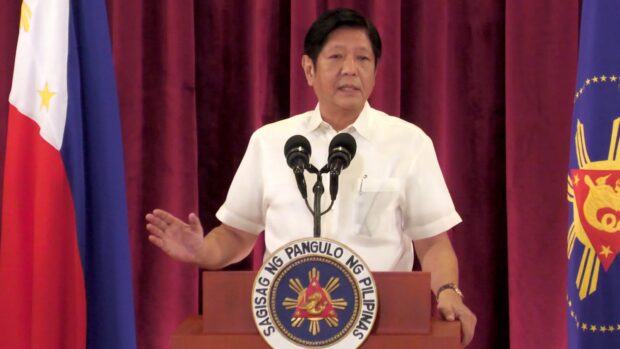
President Ferdinand Marcos Jr. delivers a speech at the Villamor Airbase in Pasay City before flying to Saudi Arabia on Thursday, October 19, 2023, to attend the Association of Southeast Asian Nations-Gulf Cooperation Council Summit. | PHOTO: INQUIRER.net/Ryan Leagogo
President Ferdinand Marcos Jr. on Thursday said the suspension of the implementing rules and regulations (IRR) of the Maharlika Investment Fund (MIF) was meant to make the country’s first sovereign wealth fund “as close to perfect and ideal as possible.”
In his speech at Villamor Air Base before leaving for Saudi Arabia to attend the Association of Southeast Asian Nations-Gulf Cooperation Council Summit (Asean-GCC) in Riyadh, the President said the MIF would be up and running by year-end.
He said the concept of the MIF as a sovereign wealth fund “remains a good one,” and “we are still committed to having it operational before the end of the year.”
“So we should not misinterpret what we have done as somehow a judgment on the rightness or wrongness of the Maharlika Fund,” he said.
“On the contrary, we are just finding ways to make it as close to perfect and ideal as possible. And that was what we have done,” he added.
READ: The Maharlika Investment Fund and its promise
Mr. Marcos made the clarification as he admitted that he was a “bit alarmed” by news reports that the MIF was put on hold.
“Quite the contrary. The organization of the Maharlika Fund proceeds apace. And what I have done though is that we have found more improvements that we can make specifically to the organizational structure of the Maharlika Fund,” he said, without elaborating.
According to the President, the possible improvements in the IRR of the MIF were done in consultation not only with the government’s economic managers but also with the people and the personalities who would actually be involved in the fund.
Memo on IRR suspension
Concerns about the fate of the MIF stemmed from a memorandum dated Oct. 12 from Executive Secretary Lucas Bersamin and addressed to the heads of the Bureau of Treasury, Land Bank of the Philippines (Landbank) and Development Bank of the Philippines (DBP), stating that “upon the directive of the President, the Treasurer of the Philippines, in coordination with [Landbank] and DBP, is hereby directed to suspend the implementation of the IRR” of the MIF law.
Signed on July 18, Republic Act No. 11954 mandated the national treasurer to craft the IRR within 90 days. The IRR was finally issued on Aug. 28, or 41 days later.
Under the IRR, the sovereign fund will be managed by the Maharlika Investment Corp. (MIC), which will be governed by a nine-member board consisting of the finance secretary as chair in an ex officio capacity, the president of the MIC as vice chair, the chief executive officers of Landbank and DBP, two regular directors, and three independent directors from the private sector.
Pending further study
The regular directors will be appointed by the President upon the recommendation of the MIF advisory body, which consists of the budget secretary, the head of the National Economic and Development Authority and the national treasurer.
According to the memorandum issued by Bersamin, the suspension stands “pending the further study” of the IRR.
Line-by-line review
Budget Secretary Amenah Pangandaman said on Thursday that the economic team would “prudently review” the provisions of the IRR ahead of the MIF’s launch before the end of the year.
“The economic team will work closely with the President to prudently review all provisions line by line and make sure that all things are in order,” Pangandaman noted.
“We will also take this opportunity to engage in more multistakeholder groundwork in preparation for the launch of the MIF,” she added.
Pangandaman did not answer when asked for the specific provisions of the IRR that the economic managers would revisit.
“We subscribe to the wisdom of [the President] in suspending the IRR as this is not just an economic strategy for us but a historic first sovereign investment fund,” the budget chief said.
At the same time, the members of the MIF advisory body have yet to respond to questions on whether Landbank and DBP would get back their contributions to the MIF while the IRR is being studied.
In his speech after signing RA 11954, the President said the MIF was “designed to drive economic development,” while the Department of Finance said the fund was designed “to accelerate the country’s growth by optimizing the use of government financial assets.”
Possible misuse
Critics, however, warned about possible misuse of the money.
A group led by Senate Minority Leader Aquilino Pimentel III also filed last month a petition at the Supreme Court questioning the legality of the MIF law.
In the petition, the group claimed that it was a “dangerous” law as it “entrusts hundreds of billions in public funds to unknown fund managers and an amorphous nine-member Board of Directors.”